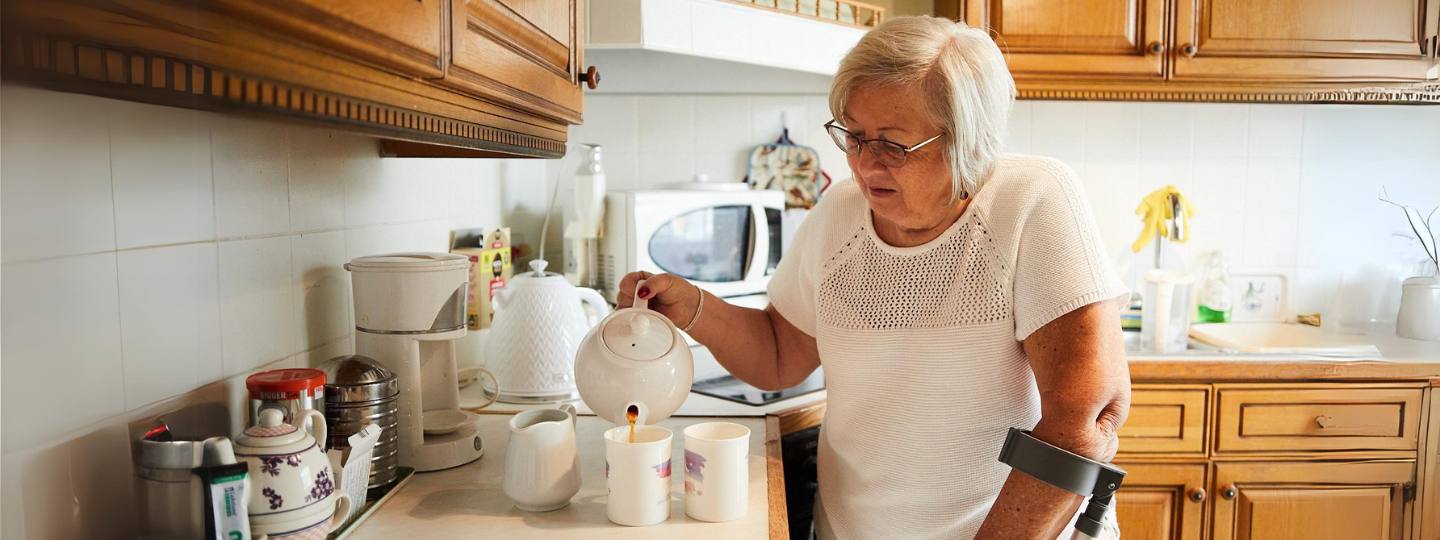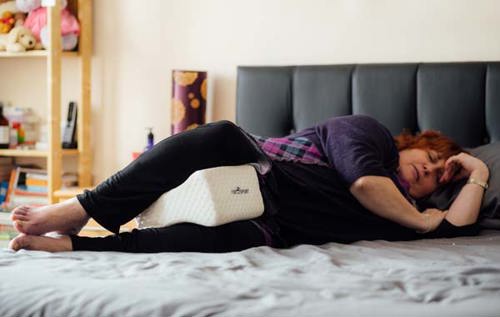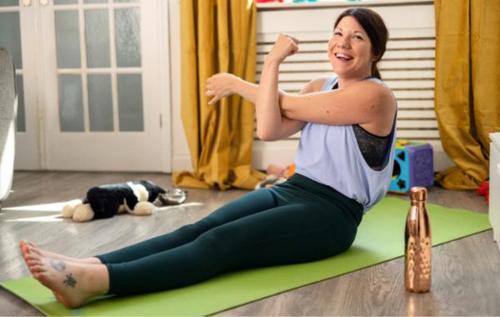Living with arthritis: Tips for coping with morning pain and stiffness
21 February 2024
Do you wake up with stiff and achy muscles? Or does fatigue leave you feeling tired even after a full night's sleep? If this sounds familiar, you’re not alone.
We know that the simple act of getting out of bed can feel like a monumental challenge for some people living with arthritis.
But there are small steps you can take that might make your mornings a little easier.
Tips for better mornings
Want to improve your morning routine? Here are a few practical tips on how to kickstart your day from people living with arthritis.
Try and get a good night’s sleep
 If you want to have a better morning, getting a better night’s sleep is a good place to start.
If you want to have a better morning, getting a better night’s sleep is a good place to start.
To improve your sleep, you could try:
- Keeping a sleep diary, which might help you spot any patterns.
- Making your bedroom dark, calm, and comfortable.
- Turning off your devices an hour before bedtime.
- Creating a routine (by trying to go to bed and waking up around the same time every day).
- Limiting your caffeine intake (for example, not drinking as much tea, coffee, or energy drinks, particularly later in the day).
Christine, 24, lives with psoriatic arthritis, and says scheduling her medicines helps her sleep better too.
“I usually take a pain killer before going to sleep and that will usually help throughout the night,” she explains.
Learn more about getting a good night’s sleep
Planning rather than rushing
If you’re dealing with pain and stiffness, the last thing you want to do is rush to get ready.
If your mornings are hectic, why not try to do as much as you can the night before? For example, you could:
- Set out your outfit.
- Get any packed lunches ready.
- Prepare your breakfast.
Time can quickly slip away in the morning, so it’s also helpful to wake up a bit earlier than you need to.
This will give you plenty of time to get washed, dressed and take your medicines.
Discover our tips for navigating the bathroom
Taking your medicines
Some people find it helpful to set an alarm and take their pain medicines before they need to get up. But just make sure you follow the instructions on the pack - some medicines must be taken with food.
Stay active
 It can be hard to keep moving when you have arthritis, but staying as active as possible can help reduce your pain, ease stiffness, and improve your energy levels.
It can be hard to keep moving when you have arthritis, but staying as active as possible can help reduce your pain, ease stiffness, and improve your energy levels.
Why not start the day with a few simple stretches, go for a walk or try swimming or Tai Chi?
It’s about finding what you enjoy, as this will make it easier to make physical activity a part of your day-to-day routine.
Lorna, 31, lives with rheumatoid arthritis, and says that “movement helps so much. The first thing I do when I get up in the morning is go for a walk with [my dog] Nora.”
Meanwhile, Jade, 32, lives with psoriatic arthritis, and says she “sets aside 15 minutes in the morning to do her stretches.”
Full body stretching: Morning routine for arthritis and joint pain
Apply heat
Applying heat can be a fantastic way to soothe stiff or achy joints. So, if you struggle with morning stiffness, you could try:
- applying a hot shower.
- applying a hot water bottle.
- soaking sore hands in a sink full of warm water.
For instance, Jade, 32, who lives with psoriatic arthritis, says that “hot baths with Epsom salts” are now a regular part of her routine.
Find ways to relax
 Mornings can be a hectic time. So, taking a few moments to relax might help you start your day off right.
Mornings can be a hectic time. So, taking a few moments to relax might help you start your day off right.
Melissa, 25, lives with lupus (SLE), and says writing in a gratitude journal in the morning helps her manage her stress levels.
“I’ll write down what I'm grateful for, how my day's gone so far, and I’ll reflect on it,” she explains. “It's important to write your worries down because sometimes they can build up.”
Meanwhile, William, 10, who lives with juvenile idiopathic arthritis, says that “singing and music relaxes my pain.”
Everyone’s different, so it’s about finding what works for you.
Ask about flexible work arrangements
Delyth, 48, lives with several conditions, including rheumatoid arthritis, osteoarthritis, and fibromyalgia. She says that flexible working arrangements have made her mornings far less stressful.
“Even though I work full time, I do flexible hours,” she explains. “I can start later in the morning if I’m struggling first thing and then work later into the evening if I need to.”
If you find work challenging, why not talk to your line manager or HR department to find out what flexible working arrangements might be available to you?
Get help and support
If you find mornings difficult, don’t be afraid to ask for help. Maybe a family member could prepare breakfast or a friend could take your children to school?
An occupational therapist can also assess your home and provide tips or equipment to help you carry out everyday tasks.
For instance, if you find getting dressed difficult, they might suggest aids such as button hooks, zip pullers, or long handled shoehorns which might make things a bit easier.
Read our tips on getting dressed
We’re here for you
If you need more advice or support, remember you can:
- Call our free helpline on 0800 5200 520
- Chat to our Arthritis Virtual Assistant
- Join our online community
- Stay in touch and follow us on X (Twitter), Facebook and Instagram.